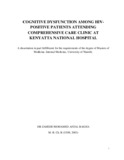| dc.description.abstract | Objective: To determine the prevalence of cognitive dysfunction among HIV -positive patients attending the Comprehensive Care Clinic (CCC) at Kenyatta National Hospital.
Design: Cross-sectional study.
Setting: Comprehensive Care Clinic, Kenyatta National Hospital. Subjects: HIV -positive patients.
Sampling, Data Collection and Analysis: Random sampling was done. Data was
entered into a questionnaire, transferred to Excel and analysed using Stata version 11.0.
Results: The prevalence of cognitive dysfunction was 26%. The female: male ratio was 2.6: 1. The peak: age was 38-47 years with a mean age of 38.3 +/-7.9 yrs and a median of 38 years. For HIV -positive patients with cognitive dysfunction, the odds of having secondary and tertiary education were xO.271and xO.169 respectively that of having primary education (P=0.OI2). HIV-positive patients with cognitive dysfunction were more likely to be older (mean age was 40.7 +/- 7.6 years), have baseline and nadir CD4 counts 200/lll and duration of HIV infection and duration of HAART for 2: 2 years compared to HIV-positive patients with no cognitive dysfunction. However, these differences were not statistically significant.
\
Conclusion and Reeommendationsr Cognitive dysfunction is quite prevalent (26%) among HIV-positive patients attending the CCC at KNH despite the fact that >75% of those with cognitive dysfunction were on HAART, and >50% were on HAART for 2: 2 years. This could be explained by the 'legacy effect' of HIV infection in the CNS. No statistically significant associations between cognitive dysfunction and sociodemographic and laboratory variables were found except for education. This could be due to the fact that education may be protective against dementia. In conclusion, HIV -positive patients should be routinely screened for cognitive dysfunction using the IHDS tool. | en_US |

